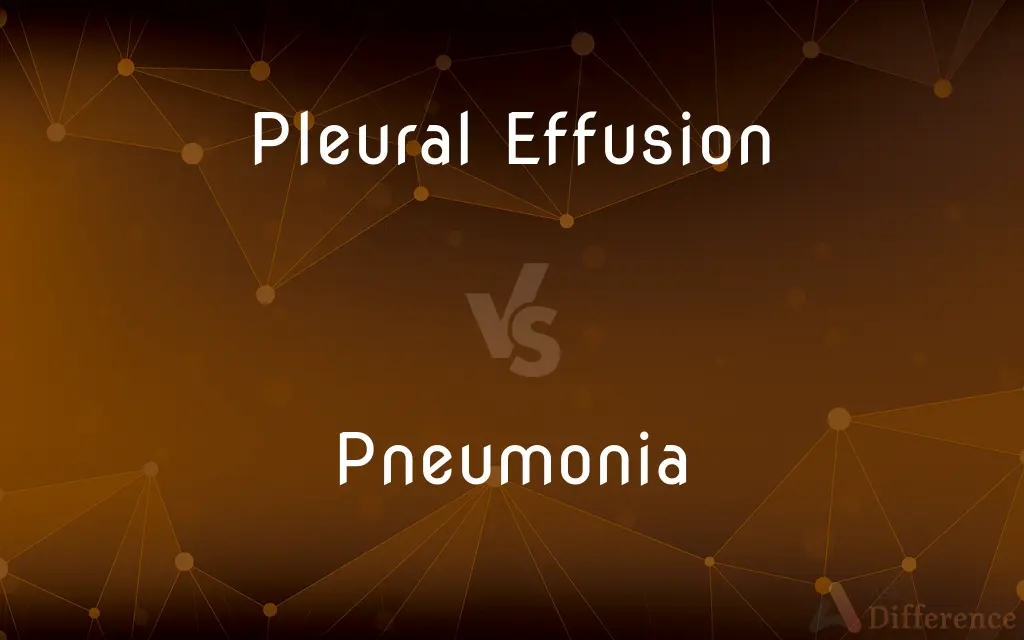Pleural Effusion vs. Pneumonia — What's the Difference?
By Tayyaba Rehman — Published on November 4, 2023
Pleural Effusion is fluid collection in the pleural space. Pneumonia is an Infection causing inflammation of the lung's air sacs.

Difference Between Pleural Effusion and Pneumonia
Table of Contents
ADVERTISEMENT
Key Differences
Pleural Effusion is a medical condition that involves the accumulation of excess fluid between the two layers of the pleura, which are the thin membranes lining the lungs and the chest wall. Pneumonia, on the other hand, is an infection that inflames the air sacs in one or both lungs, which may fill with fluid or pus, causing a cough with phlegm or pus, fever, chills, and difficulty breathing.
In the case of Pleural Effusion, the fluid buildup can be caused by various medical conditions such as heart failure, malignancies, or pulmonary embolism, and it may lead to breathing difficulties due to the pressure exerted on the lungs. In contrast, Pneumonia is typically caused by bacterial, viral, or fungal infections and its manifestations are generally more systemic, often involving fever, malaise, and respiratory symptoms.
Treatment for Pleural Effusion often involves addressing the underlying cause and may include draining the excess fluid to ease breathing. Pneumonia, depending on its etiology, is commonly treated with antibiotics (for bacterial causes), antivirals (for viral causes), or antifungals (for fungal causes), alongside supportive care such as oxygen therapy and pain management.
People with Pleural Effusion may experience symptoms like chest pain and dry, hacking coughs, whereas symptoms associated with Pneumonia tend to be more varied and can include a productive cough, fever, and sometimes, confusion, especially in older adults. Both conditions can exist simultaneously, where pneumonia leads to a pleural effusion, complicating diagnosis and management.
Pleural Effusion and Pneumonia are conditions that both impact the respiratory system, but they have distinct differences in terms of etiology, symptomatology, and management. The former relates more to physical mechanics and pressure on the lungs, while the latter involves an active infection and a response from the immune system.
ADVERTISEMENT
Comparison Chart
Definition
Accumulation of fluid in the pleural space.
Infection that inflames the lungs' air sacs.
Common Causes
Heart failure, malignancy, pulmonary embolism
Bacteria, viruses, fungi
Characteristic Symptoms
Shortness of breath, dry cough
Productive cough, fever, chills
Treatment Approach
Draining fluid, addressing underlying cause
Antibiotics, antivirals, antifungals
Potential Complications
Lung collapse, infection
Sepsis, respiratory failure
Compare with Definitions
Pleural Effusion
Pleural Effusion refers to the buildup of excess fluid in the pleural cavity.
The doctor diagnosed him with pleural effusion after noting fluid in his chest X-ray.
Pneumonia
Pneumonia can be community-acquired or hospital-acquired, differing in typical pathogens.
The patient developed hospital-acquired pneumonia after surgery.
Pleural Effusion
The condition can manifest as breathlessness and a dry cough.
Breathlessness while climbing the stairs was his primary symptom of pleural effusion.
Pneumonia
Symptoms often include productive cough, fever, and sometimes dyspnea.
High fever and a persistent, productive cough are classic symptoms of pneumonia.
Pleural Effusion
Pleural Effusion may lead to a pleuritic type of chest pain.
She felt a sharp, stabbing sensation, indicative of pleuritic pain from pleural effusion.
Pneumonia
Treatment and management depend largely on the etiological agent and patient status.
In managing her viral pneumonia, the primary approach was supportive care, including oxygen therapy.
Pleural Effusion
It is often categorized as transudate or exudate based on fluid composition.
The lab results showed that the pleural effusion was an exudate, indicating potential inflammation.
Pneumonia
Pneumonia is an inflammatory condition affecting the pulmonary alveoli.
The patient’s persistent cough and fever led to a diagnosis of pneumonia.
Pleural Effusion
Treatment may involve therapeutic thoracentesis to remove the fluid.
To relieve his breathing difficulty, a thoracentesis was performed to drain the pleural effusion.
Pneumonia
It can be classified as bacterial, viral, or fungal based on the causative agent.
Antibiotics were prescribed to treat his bacterial pneumonia.
Pneumonia
An acute or chronic disease marked by inflammation of the lungs, usually caused by a bacterium, virus, or other infectious agent.
Pneumonia
An acute or chronic inflammation of the lungs caused by viruses, bacteria or other microorganisms, or sometimes by physical or chemical irritants.
Pneumonia
Inflammation of the lungs.
Pneumonia
Respiratory disease characterized by inflammation of the lung parenchyma (excluding the bronchi) with congestion caused by viruses or bacteria or irritants
Common Curiosities
What is pneumonia?
Pneumonia is an infection that inflames the air sacs in one or both lungs.
Can pneumonia be prevented?
Yes, pneumonia can often be prevented through vaccination and good hygiene practices.
What is pleural effusion?
Pleural effusion is the accumulation of fluid in the space between the lung and chest wall.
Can pleural effusion cause pneumonia?
While pleural effusion itself doesn’t cause pneumonia, pneumonia can lead to pleural effusion.
What are the main symptoms of pleural effusion?
The main symptoms often include shortness of breath and a dry cough.
Is pleural effusion a type of infection?
Not necessarily; pleural effusion is a symptom or result of other conditions and can be infectious or non-infectious.
How is pleural effusion treated?
Treatment may involve draining the fluid and addressing its underlying cause.
Can pleural effusion recur?
Yes, pleural effusion can recur, especially if the underlying cause is not fully addressed.
What is a potential complication of pleural effusion?
Potential complications include lung collapse and pleural infection.
Is pneumonia contagious?
Yes, pneumonia, particularly bacterial and viral types, can be contagious.
What are potential complications of pneumonia?
Pneumonia can lead to sepsis, lung abscesses, and respiratory failure.
What are the main symptoms of pneumonia?
Pneumonia typically presents with a productive cough, fever, and chills.
Can children get pneumonia?
Yes, pneumonia can affect individuals of all ages, including children.
How is pneumonia treated?
Treatment involves antibiotics, antivirals, or antifungals, depending on the cause, alongside supportive care.
Share Your Discovery

Previous Comparison
Dry Measuring Cups vs. Liquid Measuring Cups
Next Comparison
ASP vs. DSPAuthor Spotlight
Written by
Tayyaba RehmanTayyaba Rehman is a distinguished writer, currently serving as a primary contributor to askdifference.com. As a researcher in semantics and etymology, Tayyaba's passion for the complexity of languages and their distinctions has found a perfect home on the platform. Tayyaba delves into the intricacies of language, distinguishing between commonly confused words and phrases, thereby providing clarity for readers worldwide.












































